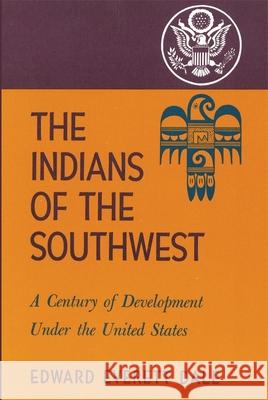The Indians of the Southwest, Volume 28: A Century of Development Under the United States » książka
The Indians of the Southwest, Volume 28: A Century of Development Under the United States
ISBN-13: 9780806113142 / Angielski / Miękka / 1949 / 334 str.
Volume 28 in The Civilization of the American Indian Series. With the signing of the Treaty of Guadalupe Hidalgo in 1848 the United States became responsible for the administration of some 125,000 Indians in addition to those already within the national boundaries. The new tribes included many peoples known only to traders and trappers who had ventured into the trackless stretches of the West. This book considers the hundred-year record of federal relations with these Indians. The first two decades of United States control are seen as a period of large-scale humanitarian purpose, flawed in many cases by racial prejudice, official corruption, or outright cruelty and abuse. New policies under Ulysses S. Grant and an awakening of public conscience in the 1870's and 1880's brought a second major period, characterized by the system of reservations. Later chapters of the book deal with twentieth-century changes, particularly with agents, schools, and medical services, all carefully analyzed by the author, who was a member of the Meriam Commission in 1926-27. The record reveals in realistic detail the problems of the government and the tenacity of the tribes in resisting while settlement and retaining their own culture and way of life. EDWARD EVERETT DALE was Professor Emeritus of History at the University of Oklahoma. He was the first director of the Frank Phillips Collection which merged in 1967 with the Manuscript Division and is now known as the Western Histories Collection at the University of Oklahoma. He was a frequent contributor to both scholarly and popular periodicals and the author of several books including Cherokee Cavaliers also published by the University of Oklahoma.
Volume 28 in The Civilization of the American Indian Series. With the signing of the Treaty of Guadalupe Hidalgo in 1848 the United States became responsible for the administration of some 125,000 Indians in addition to those already within the national boundaries. The new tribes included many peoples known only to traders and trappers who had ventured into the trackless stretches of the West. This book considers the hundred-year record of federal relations with these Indians.The first two decades of United States control are seen as a period of large-scale humanitarian purpose, flawed in many cases by racial prejudice, official corruption, or outright cruelty and abuse. New policies under Ulysses S. Grant and an awakening of public conscience in the 1870s and 1880s brought a second major period, characterized by the system of reservations.Later chapters of the book deal with twentieth-century changes, particularly with agents, schools, and medical services, all carefully analyzed by the author, who was a member of the Meriam Commission in 1926-27. The record reveals in realistic detail the problems of the government and the tenacity of the tribes in resisting while settlement and retaining their own culture and way of life.EDWARD EVERETT DALE was Professor Emeritus of History at the University of Oklahoma. He was the first director of the Frank Phillips Collection which merged in 1967 with the Manuscript Division and is now known as the Western Histories Collection at the University of Oklahoma. He was a frequent contributor to both scholarly and popular periodicals and the author of several books including Cherokee Cavaliers also published by the University of Oklahoma.











